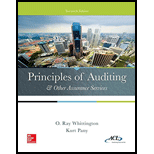
Principles of Auditing & Other Assurance Services (Irwin Accounting)
20th Edition
ISBN: 9780077729141
Author: Ray Whittington, Kurt Pany
Publisher: McGraw-Hill Education
expand_more
expand_more
format_list_bulleted
Concept explainers
Question
Chapter 4, Problem 30OQ
a.
To determine
Whether the accountants were liable or not under various theories discussed.
b.
To determine
Whether the accountants were liable or not under various theories discussed.
c.
To determine
Whether the accountants were liable or not under various theories discussed.
d.
To determine
Whether the accountants were liable or not under various theories discussed.
e.
To determine
Whether the accountants were liable or not under various theories discussed.
f.
To determine
Whether the accountants were liable or not under various theories discussed.
g.
To determine
Whether the accountants were liable or not under various theories discussed.
Expert Solution & Answer
Want to see the full answer?
Check out a sample textbook solution
Students have asked these similar questions
Please provide the solution to this financial accounting question using proper accounting principles.
I need the correct answer to this financial accounting problem using the standard accounting approach.
what is its number of days sales in receivables ?
Chapter 4 Solutions
Principles of Auditing & Other Assurance Services (Irwin Accounting)
Ch. 4 - Prob. 1RQCh. 4 - Prob. 2RQCh. 4 - Prob. 3RQCh. 4 - Prob. 4RQCh. 4 - Prob. 5RQCh. 4 - Prob. 6RQCh. 4 - Prob. 7RQCh. 4 - Prob. 8RQCh. 4 - Prob. 9RQCh. 4 - Prob. 10RQ
Ch. 4 - Prob. 11RQCh. 4 - Prob. 12RQCh. 4 - Prob. 13RQCh. 4 - Prob. 14RQCh. 4 - Prob. 15RQCh. 4 - Prob. 16RQCh. 4 - Prob. 17RQCh. 4 - Prob. 18RQCh. 4 - Prob. 19RQCh. 4 - Prob. 20QRACh. 4 - Prob. 21QRACh. 4 - Prob. 22QRACh. 4 - Prob. 23QRACh. 4 - Prob. 24QRACh. 4 - Prob. 25QRACh. 4 - Prob. 26QRACh. 4 - Gordon Moore, CPAs, were the auditors of Fox ...Ch. 4 - Prob. 28AOQCh. 4 - Prob. 28BOQCh. 4 - Prob. 28COQCh. 4 - Prob. 28DOQCh. 4 - Prob. 28EOQCh. 4 - Prob. 28FOQCh. 4 - Prob. 28GOQCh. 4 - Prob. 28HOQCh. 4 - Prob. 28IOQCh. 4 - Prob. 28JOQCh. 4 - Prob. 28KOQCh. 4 - Prob. 28LOQCh. 4 - Prob. 29OQCh. 4 - Prob. 30OQCh. 4 - Match the important cases listed below with the...Ch. 4 - Prob. 32OQCh. 4 - Prob. 33OQCh. 4 - Prob. 34PCh. 4 - Prob. 35PCh. 4 - Prob. 36PCh. 4 - Charles Worthington, the founding and senior...Ch. 4 - Prob. 38PCh. 4 - Prob. 39PCh. 4 - Prob. 40PCh. 4 - Prob. 41ITCCh. 4 - Prob. 42RDC
Knowledge Booster
Learn more about
Need a deep-dive on the concept behind this application? Look no further. Learn more about this topic, accounting and related others by exploring similar questions and additional content below.Similar questions
- Below is information for Blue Company. Using this information, answer the following questions on the "Calculation" tab in the file. Show your work (how you got your answer) and format appropriately. Blue company has prepared the following contribution format income statement based on a sales volume of 1,000 units (the relevant range of production is 500 to 1,500 units): Sales $ 40,000 Variable expenses 24,000 Contribution margin 16,000 NOTE: Use the amounts in the original fact pattern to the left as your basis for the questions below. Fixed expenses 12,000 Net operating income $ 4,000 Questions: 1. What is the contribution margin per unit? 2. What is the contribution margin ratio? 3. What is…arrow_forwardI am looking for help with this financial accounting question using proper accounting standards.arrow_forwardGeneral accountingarrow_forward
arrow_back_ios
SEE MORE QUESTIONS
arrow_forward_ios
Recommended textbooks for you
 Auditing: A Risk Based-Approach (MindTap Course L...AccountingISBN:9781337619455Author:Karla M Johnstone, Audrey A. Gramling, Larry E. RittenbergPublisher:Cengage Learning
Auditing: A Risk Based-Approach (MindTap Course L...AccountingISBN:9781337619455Author:Karla M Johnstone, Audrey A. Gramling, Larry E. RittenbergPublisher:Cengage Learning Auditing: A Risk Based-Approach to Conducting a Q...AccountingISBN:9781305080577Author:Karla M Johnstone, Audrey A. Gramling, Larry E. RittenbergPublisher:South-Western College Pub
Auditing: A Risk Based-Approach to Conducting a Q...AccountingISBN:9781305080577Author:Karla M Johnstone, Audrey A. Gramling, Larry E. RittenbergPublisher:South-Western College Pub- Business Its Legal Ethical & Global EnvironmentAccountingISBN:9781305224414Author:JENNINGSPublisher:Cengage

Auditing: A Risk Based-Approach (MindTap Course L...
Accounting
ISBN:9781337619455
Author:Karla M Johnstone, Audrey A. Gramling, Larry E. Rittenberg
Publisher:Cengage Learning


Auditing: A Risk Based-Approach to Conducting a Q...
Accounting
ISBN:9781305080577
Author:Karla M Johnstone, Audrey A. Gramling, Larry E. Rittenberg
Publisher:South-Western College Pub

Business Its Legal Ethical & Global Environment
Accounting
ISBN:9781305224414
Author:JENNINGS
Publisher:Cengage
